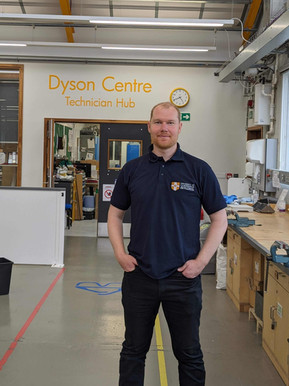
In the United Kingdom, we have a big problem with electronic waste. We're the second-worst country when it comes to throwing away electronics, and we're on a path to being the worst! But don't panic, there's a solution right under our noses – fixing things and using them again!
Here, we dive deeper into the work of repairing and reusing and talk to one of The Wheel's former volunteer Repairers whose work at the Repair Café contributed to an exciting career opportunity!
Why do repair and reuse matter?
A "circular economy" is all about creating a system where materials are not wasted and nature is protected and regenerated. Keeping valuable resources in the loop through repairing, repurposing and reusing things is key to making this happen in the UK.
Last year, we launched The Wheel (thewheelmerton.org) - Merton's waste reduction and circular economy hub - to help create a more circular Merton. So check it out if you haven’t already!
Saving Money: Fixing things can save you a lot of cash. When items are built to be repaired, you don't need to buy new things all the time. This means more money in your pocket!
Community Repair Events: People all over the UK are coming together to fix things in their communities where they're fixing items, learning new repair skills, making their communities stronger and even making friends. Our Repair Cafés and Preloved Studio events held at Canons House, Mitcham, demonstrate that many Merton residents want to repair things instead of throwing them away. It's better for people and the planet. Why not come along to the next one? Details can be found on The Wheel website.
Creating Green Jobs: Repair and reuse can also lead to more jobs, especially green jobs, in areas like fixing appliances or selling second-hand items. These jobs help the environment and give people work. Here's just one of our success stories...
WILL'S STORY

To celebrate International Repair Day (21st October) we were delighted to speak with one of The Wheel's former volunteer Repairers, Will, who went on to get a job as Chief Technician on a Dyson Project at Cambridge University.
1. Why did you volunteer at The Repair Café?
I have always liked taking things apart and understanding how things work. The Wheel's Repair Café seemed like a great way to develop my skills and join the push towards a more sustainable world.
At the time, I was just embarking upon a career change to university teaching technician work, so this was a great free way to build my skills and bolster my CV.
2. What were the most valuable skills and/or experiences you gained from being a Repair Cafe Volunteer?
The range of volunteers at the restart project meant I could ask for help with anything I wasn't sure of. This availability of experts allowed me to develop my skills in laptop repair, simple electrical fault solving and electronic circuit board analysis without having to do a complete course in any of them.
There are many things which I wouldn’t have thought possible to fix without years of training, but a lot of the issues were as simple as a wire had snapped inside, the battery had died or there was a short circuit on the circuit board. And when I saw other repairers tackling these kinds of problems with ease, it really gave me the confidence to give it a go myself.

3. How has your experience as a volunteer Repairer helped you with this next stage in your career and personal growth? Any tips, advice or recommendations?
I joined The Wheel's Repair Café in October 2022, and less than 1 year later I was offered a job at Cambridge University as a teaching technician in the engineering department. This was aided by volunteering at the Repair Café and by my involvement in the 'The South London Maker Space’ in Herne Hill, which is a community of makers who group fund a workshop space for a monthly fee. There are 3D printers, a laser cutter, electronics, woodwork and textiles equipment available inside for members to use for their personal projects, and it’s also a great place to meet like-minded people.
I would recommend both of these things to anyone with an interest in improving their technical skills, maybe to aid a career in STEM, help the community, or just for their own enjoyment. Newcomers to the Repair Café could start by shadowing an experienced Repairer, then working alongside them and eventually setting up on a table of their own.
If you are interested in volunteering at The Wheel's Repair Café where you can develop your skills alongside repair professionals with years of experience then please get in touch at thewheel@sustainablemerton.org!
The Wheel wants to bring more "trainee" volunteer Repairers on board who shadow the more experienced Repairers to build a succession of repair skills. Why not give it a go as you never know what doors it can open for you with your career in the future!
We Need Rules
To make repair and reuse the norm, we need some rules from the government which is why The Wheel has signed The UK Repair & Reuse Declaration in conjunction with International Repair Day (21st October). Over 110 UK groups have signed up to a new Repair and Reuse Declaration calling for support from the UK government to move away from our throwaway economy.
Coordinated by The Restart Project, the Declaration is supported by more than 90 community repair groups alongside the Design Council, Keep Britain Tidy and other NGOs, and businesses including Back Market, Techbuyer and SUEZ recycling and Recovery UK. The declaration calls on the UK government to make it easier for people to repair products and pass them on to others for a second life. MPs are being invited to support the Declaration, which has already been endorsed by MPs from the
Conservative, Labour and Lib Dems.
A Vision for the Future
Imagine a world where fixing things is a big business. Things are built to last, and companies help us keep our stuff for a long time. When something breaks, fixing it is the first choice, not throwing it away.
Affordable Repairs: If fixing things is cheaper through tax breaks and vouchers, more people will do it.
Repair Rules: Rules about fixing things should cover everything, make things last longer, and make fixing easier.
Helping You Choose: A guide can help you pick items that last longer, which encourages companies to make better products.
Reuse and Repair First: We need rules that say it's better to fix and reuse than to throw things away. This will help protect the environment.
Training New Fixers: We need more people who can fix things. Training programs, certificates, and apprenticeships can help with that.
Final thoughts...
The UK's problem with electronic waste can actually be a chance to make things better. Repairing and reusing things are the keys to a sustainable future which is why community events and government support can make the UK a leader in using things wisely, setting an example for the world.
Get in touch via The Wheel's website if you would like to develop or share your repair skills at our Repair Cafes in Mitcham We would love to see you there!





コメント